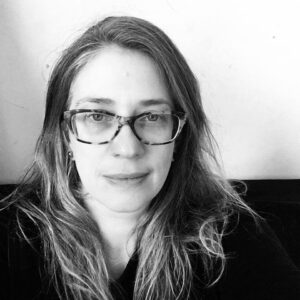
Name: Dr Una MacGlone
School/College: Reid School of Music, ECA
Research Area: Investigating processes in and wellbeing impacts of participation in community music for children and young people with additional support needs.
Role Name: British Academy Postdoctoral Fellow
Webpage/Profile: https://www.unamacglone.co.uk
PURE profile: https://www.research.ed.ac.uk/en/persons/una-macglone
Before I undertook my PhD and postdoc, I had a portfolio career as a musician, teacher and community musician. My experience has proved me with a starting point to investigate different aspects of working creatively with music with people of all ages, with and without disabilities. Improvisation is absolutely central to my work; its potential for providing accessible ways for musical and cross-arts expression is unparalleled. Understanding the complexity of interactions in improvisation in groups and how its facilitated has meant that I’ve engaged with different literatures and disciplines, namely music psychology, music education and music therapy.
Motivation
My choice to undertake a postdoc was motivated by different elements. One of these was to develop key strands of practice-based research derived from my freelance career. This was realised in collaboratively designing and refining creative musical workshop activities with a Community Music group. Working with many different stakeholders such as children, teachers parents and carers and support staff is something I enjoy very much. Developing approaches to participatory research was an important element to explore in my postdoc. Writing a journal article with lay researchers who have disabilities was a recent highlight, developing my practice as a participatory researcher has been particularly rewarding. I still deliver creative music workshops from time to time; even though day-to-day life has largely lost Covid restrictions, it still feels like an incredible privilege to experiment with sound and make music in a room with people. The conceptual gains that I’ve developed through my postdoc research have informed my approach to working musically with people, as well as motivating me to think about how this could work for other diverse groups.
Connecting with other postdocs
I meet other postdocs through many networks. I’m affiliated with the British Academy Early Career Network, who have a new Scottish Hub. This is one network I would definitely recommend to other ECRs, for some aspects of my work it’s been very useful to have local contacts. At Edinburgh, I’m a member of the Edinburgh Futures Institute, the Edinburgh Mental Health Network as well as the Centre for Research in Education Inclusion and Diversity and Children and Young People Hub at Moray House. All of these have been extremely valuable in gaining the interdisciplinary feedback that my postdoc needs. Managing all the exciting looking invitations to research and networking events can be tricky, I have to make decisions about what to attend. However, I feel that its important to keep an eye on the nature of research activities shared by these groups as a way of understanding my interdisciplinary research landscape. Sometimes just dropping someone an email to talk about what could be a shared interest is a way of connecting that has had great rewards, I’ve met some other postdocs involved in some interesting work in the arts and health at Edinburgh who use very different approaches and methods from me. Another way I’ve connected with postdocs, was to email authors of article I particularly enjoyed, to congratulate them on their work and ask questions. I’m meeting some Swedish postdocs for dinner at a conference next year as the result of such a conversation.
Mentoring
Part of my Fellowship application was naming a suitable mentor in the proposal; I’m working with Prof. Raymond MacDonald from ECA. We discuss funding applications and career opportunities but, for me what has been particularly valuable is discussion about ideas, research findings and outputs. I think that mentoring can come from more than one person, outwith Edinburgh, I have a couple of senior academics who have given me advice on specific issues. I also believe that it can be very useful to speak with people who are a little bit further on in their careers. For example, I recently reached out to someone newly in a lectureship for career advice. I think I’ve become much bolder over the last six months; people have been very generous with their time and advice which I’m incredibly grateful for. I have my own mentees who have sought me out and I believe it’s not just good karma to mentor others, you gain in other ways too through a reciprocal exchange.
I realise … as I run out of words ….my blog hasn’t touched on my take about challenges that accompany fixed-term contracts in academia. I have a plenty of experience with precarity and knockbacks in my freelance career in the arts and negotiating this as a mother. I wouldn’t say that this makes me more resilient exactly, more that I have good knowledge of how I deal and don’t deal with uncertainty. Perhaps this could inform another blog! If any of my research interests or #PostdocResearcherRealities resonate – do drop me an email: Una.MacGlone@ed.ac.uk


